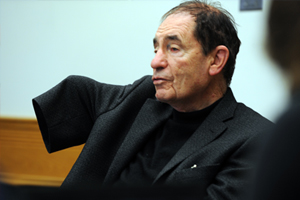Reason for passion
Undergrads learn constitutional law from the South African James Madison.
By Lydialyle Gibson
Photography by Dan Dry
Three months after stepping down from South Africa’s highest court, where he spent 15 years interpreting the constitution he helped write after apartheid finally withered, Albie Sachs sat at the head of a Cobb Hall classroom, surrounded by third- and fourth-year Chicago undergrads. It was late January, week four of a five-week course, and Sachs, the Richard and Ann Silver Pozen visiting professor in human rights, was explaining the concept of ubuntu, an ancient African ethic. “You are a person because I am a person,” he said. “I cannot separate my humanity from yours.”

Albie Sachs lost an arm and sight in one eye when South African agents bombed his car.
Called Reason and Passion: The Strange Alchemy of Life and Law, a title borrowed from Sachs’s 2009 book, the course examined legal and moral underpinnings of the new South African republic and dissected cases that came before its Constitutional Court during Sachs’s tenure. Many had yielded landmark decisions on terrorism and torture, socioeconomic rights, same-sex marriage, and the notion of human dignity and proportionality—a guiding principle of the country’s 1996 constitution. “It’s like taking a course on American constitutional law from James Madison,” said fourth-year Ryan Mills.
The class was also an exploration of Sachs’s life story and how personal experience can, and sometimes should, influence the law. Sachs joined the African National Congress as a teenager and first took part in civil disobedience at 17. As a young lawyer, he represented defendants—many facing death—accused of resisting apartheid and breaking state security laws. This work led in 1963 to Sachs’s arrest, torture, imprisonment, and months of solitary confinement. In 1966 he fled the country, first to England and later to Mozambique, where South African security agents planted a bomb in his car. The explosion nearly killed him; he lost his right arm and his sight in one eye.
Sachs never stopped working for South African liberation, though, and when apartheid began unraveling in 1990, he came home to take part in rebuilding the country. He helped write housing, water, and health-care rights into the constitution. “Justice Sachs showed us that knowledge and empathy are intertwined,” said fourth-year human-rights minor Ioana Tchoukleva, “how law is not just law, but something that affects real people.”
During the January 27 class—one of the twice-weekly discussion sections augmenting Sachs’s public lectures—he and the students dug into a 2000 case concerning a group of squatters and their children. Evicted from an informal settlement, they took shelter in a nearby sports field without sanitation or electricity. A lawsuit was filed, and the Constitutional Court ruled that the squatters, many of them women, were entitled to basic government-funded housing. During his public lecture on the case a week earlier, Sachs had asked, “How can you divide the body and the mind? The mind has rights, but the body somehow doesn’t?”
WRITE THE EDITOR
E-MAIL THIS ARTICLE
SHARE THIS ARTICLE
ALSO IN CHICAGO JOURNAL
- Center Stage: Campus events
- Cultural Studies: Brrrring it on, winter
- For the Record: University news
COLLEGE REPORT
RELATED LINK
Video: Punitive Justice vs. Restorative Justice (Mind Online, January 13, 2010)
Video: Does the Law Have a Sense of Humor? (University of Chicago Law School News Office, January 27, 2010)
